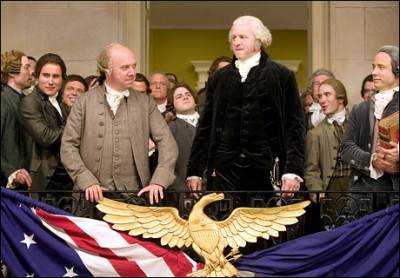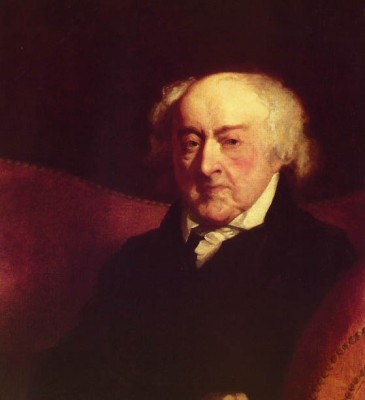| Reviews & Columns |
|
Reviews DVD TV on DVD Blu-ray 4K UHD International DVDs In Theaters Reviews by Studio Video Games Features Collector Series DVDs Easter Egg Database Interviews DVD Talk Radio Feature Articles Columns Anime Talk DVD Savant Horror DVDs The M.O.D. Squad Art House HD Talk Silent DVD
|
DVD Talk Forum |
|
|
| Resources |
|
DVD Price Search Customer Service #'s RCE Info Links |
|
Columns
|
|
|
John Adams
HBO's Blu-ray is splendid, a gorgeous presentation with excellent audio to boot, and good extras anticipating viewer interest in learning more about the historical figures and events.
The seven-part series, 501 minutes in all, details the life of John Adams from the Boston Massacre in 1775 and Adams's subsequent legal defense of the British soldiers involved to his death on the 50th anniversary of the Declaration of Independence, July 4, 1826, at the age of 90. It follows his years with the Second Continental Congress and associations with Benjamin Franklin (Tom Wilkinson), Thomas Jefferson (Stephen Dillane), George Washington (David Morse), and his more-famous cousin, firebrand Samuel Adams (Danny Huston). Later, during the Revolutionary War, Adams is dispatched to Europe, where his attempts at diplomacy with France are mostly disastrous (unlike those of Franklin and Jefferson, both of whom become hugely popular there). After the war, he becomes the unhappy first American Ambassador to Great Britain, and later still the equally unhappy first Vice President, under George Washington, before being elected to the office himself in 1797.
As with the wonderful Broadway musical and film adaptation of 1776, John Adams is "obnoxious and disliked," a passionate, educated but perpetually discontented and abrasive man. He lacks Ben Franklin's charisma, Washington's nobility, Jefferson's poetry and ingenuity, and all of their patience - and yet Adams is himself a great visionary outclassed only because icons of human history surround him. In France he's an unmitigated disaster because he's much too direct; he speaks plainly and sensibly but amidst ostentatious, debauched French society his logical pleas for military support fall on disinterested ears. By contrast, Franklin is diplomatic and shrewdly, deliberately colorful, even taking to incongruously wearing a coonskin cap - a colorful touch to live up to France's (erroneous) expectations of rustic Americana.
And yet it's Adams's earthbound frailties, his humanity that makes him all the more fascinating. It's interesting to note Giamatti's character in Sideways (2004), Miles, is not dissimilar: Miles is passionate and extremely knowledgeable about wine, a subject for which he has few peers, and yet he's also self-loathing and impatient, a social cripple intolerant of philistinism. Giamatti's Adams is much the same actually, with one major exception. Where Miles is lonely and alone, John Adams is blessed with a devoted, atypically educated and assertive wife, Abigail (Laura Linney).
Theirs is one of American history's most enduring romances, thanks partly to the voluminous correspondence that survives and makes plain their love, intelligence and mutual respect. The miniseries realistically doesn't whitewash their relationship's many ups and downs, particularly Abigail's resentment - a resentment shared by their children - over John's multi-year assignments far from the family farm in Braintree, Massachusetts.
Both actors are magnificent, especially Giamatti, who expertly conveys thousands of subtle emotions through his large, expressive eyes (with eyebrows always turned downward, as if perpetually, awesomely disappointed) and a mouth that locks into a pained grimace even when it intends to smile.
Indeed, the entire cast is excellent, and virtually all the major players deservedly won Emmys and other awards. (I was especially intrigued by all the regional accents, some of which retain traces of their British origins. Whoever guided the actors through this process earned their money and then some.)
Tom Wilkinson's Franklin is more circumspect and less overtly colorful than the Howard Da Silva model (from 1776) but also more realistic. David Morse, a surprising, ingenious choice to play Washington, is perfect: within seconds of his first appearance, Morse so perfectly captures the understated nobility of Washington that there's little doubt he's the man to lead the colonies against the British and inevitably become the new nation's first president.*
Though the film covers more than a half-century of complicated American and international history and politics, it manages to do so with an impressive level of detail and subtlety. Clearly the filmmakers were tempted to draw parallels to modern times - Abigail's proto-feminism, Alexander Hamilton's (Rufus Sewell) Reaganomics-like aims for the banks and an internationally-driven credit/debt-based economy - but thankfully they don't go overboard with this.
John Adams is quite possibly the first time this reviewer has seen extensive CGI used completely effectively. Though now capable of total photo-realism, CGI is almost never used well because either the filmmakers draw too much attention to the trick (Look at THIS! Isn't it INCREDIBLE?!), often through ostentatious sweeping camera moves, and/or the realism is spoiled by unrealistic movement (e.g., Peter Jackson's King Kong) and scale (a gajillion extras, locked in battle). John Adams's CGI effects are impressive precisely because they're not at all emphasized. The 18th century cities and harbors bustle in the background, but that's where they stay. The atmosphere is so convincingly realistic because everything seems so natural, lived-in, and everyday.
The film recalls Kubrick's Barry Lyndon in its attention to period detail and in terms of the lighting. (It also uses some of the same period music.) The actors either naturally or with a bit of makeup (or no makeup) look believably late-18th and early-19th century, and the physical hardships of that era (smallpox, bloodletting, crude dentures and eyewear, etc.) are realistically portrayed, as are the hazards of transatlantic travel, etc. Though some historic details have been changed for dramatic purposes, everything feels resolutely authentic, and McCullough himself describes it as the first film to cover this period of American history so well.
At its best the series has a marvelous transcendental quality: scenes of separation and reunion with John and Abigail; his bemusement at the grotesque indulgences of France's privileged class; spectators straining to hear George Washington taking the Oath of Office, his voice barely above a whisper; Adams, Franklin, Jefferson, and Abigail marveling at an early hot air balloon taking flight, aware of the significance of its historic flight. It's a magnificent achievement, not to be missed.
Video & Audio
Shot in 35mm and presented in 1.78:1 widescreen, John Adams looks great on Blu-ray disc. The 1080p presentation is spread over three single-sided 50GB discs. The level of detail is extraordinary revealing myriad unflattering facial blemishes, wrinkles, liver spots, etc., in the actors' features and the integration of the real and CGI backgrounds are essentially flawless. I'm sure this looks fine on standard DVD but the extra expense to get this in high-def definitely is worth it.
The disc includes 5.1 DTS-HD Master Audio that really comes alive in the film's battle scenes, including an especially harrowing one at sea. 2.0 DTS Stereo Surround tracks in Spanish and French are also available, as well as subtitles in all three languages plus English subtitles for the deaf and hearing-impaired.
Extra Features
Supplements include enhanced features accompanying the episodes: Facts Are Stubborn Things is an onscreen historical text guide pointing the shows' fidelity to historic fact while pointing out changes made here and there for dramatic purposes. The illustrated Who's Who in History offers welcome if brief character biographies. Both are among the first such features this reviewer has found truly useful and interesting.
Also included are two good featurettes, both well-above average for obvious tie-ins: David McCullough: Painting with Words (39 minutes) and The Making of 'John Adams' (29 minutes). The former is mostly a personal portrait rather than a biography, but it's fascinating and surprising in many ways. The Making of includes interviews with all of the key personnel (including co-executive producer Tom Hanks) and goes into considerable detail, albeit with spoilers. Both shows are also in high-definition.
Parting Thoughts
John Adams is a must. It's a totally absorbing, unrelentingly fascinating look at a great American, told in style that went out with David Lean - the intimate epic, a film that catapults the viewer back into time and told so vividly that, by the time it's over, it's less like a miniseries watched than an experience shared, like that overused but in this case apt term, living history. Both in terms of content and its presentation and extras, this is one of the best Blu-ray releases of the year, and a DVD Talk Collector Series title.
* I was reminded that Morse got his start on the cult TV series St. Elsewhere, a series that co-starred William Daniels, whose signature role remains John Adams in 1776.
Film historian Stuart Galbraith IV's latest book, Japanese Cinema, is on sale now.
|
| Popular Reviews |
| Sponsored Links |
|
|
| Sponsored Links |
|
|
| Release List | Reviews | Shop | Newsletter | Forum | DVD Giveaways | Blu-Ray | Advertise |
|
Copyright 2024 DVDTalk.com All Rights Reserved. Legal Info, Privacy Policy, Terms of Use,
Manage Preferences,
Your Privacy Choices | |||||||














